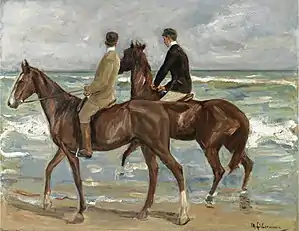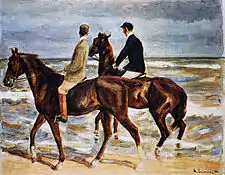Two Riders on the Beach
Two Riders on the Beach (German: Zwei Reiter am Strand) is the title of two similar paintings by the German artist Max Liebermann. Both were painted in 1901 while Liebermann was on vacation in Scheveningen on the North Sea. The paintings are considered masterpieces of German impressionism, heavily influenced by the style of French impressionist painters Édouard Manet and Edgar Degas.
| Two Riders on the Beach | |
|---|---|
| German: Zwei Reiter am Strand | |
 | |
| Artist | Max Liebermann |
| Year | 1901 |
| Medium | Oil on canvas |
| Dimensions | 71 cm × 91 cm (28 in × 36 in) |
| Location | Private collection |

One of the paintings in the 1930s belonged to the collection of Jewish factory owner and art collector David Friedmann in Wrocław, then Breslau, Silesia. It was seized by the Nazi authorities shortly after the anti-Jewish Kristallnacht pogrom in 1938 and in 1942, one of Hitler's official art dealers, Hildebrand Gurlitt, acquired Two Riders on the Beach from "Aryan" auctionneer Hans W. Lange.[1][2]
After World War II the painting was seized by Allied Monuments Men along with other works from Gurlitt's collection, and Gurlitt was investigated for his role in Nazi art looting by the Art Looting Investigation Unit.[3]
"Amazingly," Susan Ronald wrote in Hitler's Art Thief: Hildebrand Gurlitt, the Nazis, and the Looting of Europe's Treasures,
Gurlitt engineered the release of some of his sequestered artwork after he made a final statement under oath regarding the buying and sellng of art during the war. Of course, the fact that he declared that much of his collection had been verbrannt (burned) in the bombings of Hamburg and Dresden is now known to be utter fiction. Somehow he had made Edwin Rae, the chief of the Monument's, Fine Arts and Archives section in Munich, believe that four of his paintings in fact belonged to his cousin Brigitta.
— Hitler's Art Thief: Hildebrand Gurlitt, the Nazis, and the Looting of Europe's Treasures[4]
In 2012, in an event that made headlines around the world, Hildebrand Gurlitt' son, Cornelius Gurlitt, was discovered to have a secret stash of paintings. The 2012 Munich artworks discovery led to the rediscovery of Two Riders on the Beach. The surviving family of David Friedman recognized the looted painting and demanded its return, which took place in 2015. "David Toren remembers staring at Max Liebermann’s Two Riders on a Beach as his great-uncle signed over his estate to a Nazi general. Now his family has it back."[5][6]
The painting was sold at Sotheby's in June 2015.[7]
The other painting was part of a private collection in New York City before it was sold at Sotheby's in 2009. The new owner was again a private collector. The paintings are very similar; one difference is that the one that was part of Friedmann's collection shows both forelegs of the second horse.
References
- Heller, Aron (7 April 2017). "Artwork Nazis stole in WWII returning to Jewish owner's heir". Associated Press. Archived from the original on 2 June 2021. Retrieved 1 June 2021.
- Susan, Ronald (2019). Hitler's art thief: Hildebrand Gurlitt, the Nazis, and the looting of Europe's treasures. Tantor Media. ISBN 978-1-61803-750-3. OCLC 1114905985.
- "Art Looting Intelligence Unit (ALIU) Reports 1945-1946 and ALIU Red Flag Names List and Index". www.lootedart.com. Archived from the original on 16 May 2008. Retrieved 1 June 2021.
Gurlitt, Hildebrandt. Schloss Poellnitz, Aschbach (nr Bamberg). One of the chief official Paris agents for Linz, 1943-45. Partly Jewish, he had difficulties with the Party and was also placed in a difficult position as an agent for Linz. He therefore used Hermssen as his front. (Hermssen died late in 1944.) Under house arrest on the estate of Baron von Poellnitz.
- Susan, Ronald (2019). Hitler's art thief : Hildebrand Gurlitt, the Nazis, and the looting of Europe's treasures. Tantor Media. ISBN 978-1-61803-750-3. OCLC 1114905985.
- Alberge, Dalya (27 May 2015). "Reunion with looted painting is 'second victory against the Nazis'". The Guardian. Archived from the original on 7 June 2015. Retrieved 1 June 2021.
Most of David Toren's family died in the Holocaust and he, then a teenager, only survived because his father got him to safety via the Kindertransport. Now Toren has spoken of the emotion of being reunited with a painting the Nazis seized more than 75 years ago. "I felt the sense of victory – the second victory against the Nazis," he told the Guardian. Toren, now 90, was 13 when he last saw Two Riders on a Beach, an early 20th-century masterpiece by the German painter Max Liebermann, at the home of his great-uncle, David Friedmann, a passionate art collector, patron and prominent society figure in Breslau.
- Hickley, Catherine (30 April 2020). "David Toren, Who Fought to Recover Nazi-Looted Art, Dies at 94". The New York Times. ISSN 0362-4331. Retrieved 30 December 2022.
- Holmes, Ruth (24 June 2015). "Nazi-looted painting from Munich fetches close to $3m". The Times of Israel. Archived from the original on 25 June 2015. Retrieved 9 October 2022.
External links
- Carvajal, Doreen (22 May 2015). "Painting Recovered From Gurlitt Trove to Be Auctioned in London". The New York Times. Retrieved 23 May 2015.
- "Max Liebermann: Zwei Reiter am Strand nach links". Galerie Ludorff.
- Case Review: David Toren v. Federal Republic of Germany and Free State of Bavaria – Task Force Confirms Origin of Liebermann Painting